Protecting the vulnerable and achieving fairness

WINTER 2022
The quarterly magazine from CIVEA, the Civil Enforcement Association

Unbeatable service and outstanding enforcement agents. Find out more by contacting: Follow us on LinkedIn. Search Dukes Bailiffs Limited Sarah Naylor IRRV (Tech), Sales Director 07739 205 333 | snaylor@dukeslimited.co.uk
CEO’s Welcome : Russell HamblinBoone welcomes you to the Winter edition of Enforcement News.
News and Political Scraps: The latest news updates in brief.
President’s Welcome: Paul Whyte discusses the challenge of public sector debt management.
Moving collection to resolution : Civica’s Laura-Anne Smith discusses how combining data and a human approach holds the key to smarter management of local authority debt.

Protecting the vulnerable and achieving fairness : Catherine Brown introduces the Enforcement Conduct Board (ECB), followed by a view of the ECB from the frontline. We asked some key stakeholders about their expectations for the Enforcement Conduct Board.

Excel presented with Defence ERS Silver Award : Excel Civil Enforcement are recognised with the Ministry of Defence Employer Recognition Scheme (ERS) Silver Award.
Modern Slavery and Human Trafficking (MSHT) : Trevor Broadbent on increasing awareness of MSHT.
Can an audio-visual medium have a greater role in the enforcement industry? Asks Daniel Pearce.
Are enforcement companies doing enough to help customers with the cost of living crisis? JTR ask.
3 CIVEA Civil Enforcement Association • Winter 2022 • ENFORCEMENT NEWS ENFORCEMENT NEWS I WINTER 2022 Contents 09 18 10 05 06 07 09 10 15 17 18 21
CEO
COUNCIL LIST President: Paul Whyte Vice President: Sarah Naylor Treasurer: Simon Jacobs Immediate Past President: Carole Kenney Adrian Bates Amy Collins Terry Durant Luke Fowler Mike Garland Deborah Hudson Andrew Mackay Mike Marrs John Mason Andrew Rose Martyn Shapter Martin Stanford WSA 1D South House, Bond Avenue, Bletchley, Milton Keynes MK1 1SW Tel: 01908 371177 ADVERTISING / EDITORIAL Email: enfnews@ wsacommunications. co.uk Call: 01908 371177
CIVEA
Russell Hamblin-Boone
Delivering excellence in identifying and assisting vulnerable customers
















Our effective vulnerability management strategies continue to receive industry recognition and awards. We are delighted to have been presented with “The British Parking Awards 2022 Back Office Award”, recognising the industry leading work our welfare team does in identifying and supporting vulnerable customers.

0330 041 4836 | cdergroup.co.uk
Welcome To ENFORCEMENT
A prime opportunity to lift the bonnet on our industry
Welcome to the Winter ‘22 edition of Enforcement News.





In the magazine this quarter we are marking an historic evolution in civil enforcement with the launch of the Enforcement Conduct Board (ECB).
At a reception held at the House of Commons, Baroness Morgan of Cotes, formally launched the industry on its journey of supervision under the Enforcement Conduct Board. The concept of an oversight body was advanced after a roundtable meeting hosted by the Centre for Social Justice, at which Baroness Morgan was a driving force. She provided the foreword for a ground-breaking report, Taking Control for Good , which included a framework document for the fledgling supervisory body.
CIVEA was part of a working group with the debt advice sector that drafted the blueprint for the ECB, which sets a clear path for the ECB directors and sets out specific objectives. The task now is to get the Board members up to speed on modern enforcement practices and to set in motion the supervisory model.
We have high expectations for the Enforcement Conduct Board and we do not underestimate the initial challenge of designing a process for monitoring enforcement firm operations. However, we are not starting with a blank canvass. Since 2019, the Compliance, Adjudication and Review of Enforcement Panel (CARE) has independently managed compliance against the CIVEA code of practice and adjudicated on some categories of escalated complaints.
A programme of independent compliance audits of CIVEA members was reinstated following a hiatus during the pandemic. By the end of the year we expect half of CIVEA members to have completed their audits. Feedback from firms about the audits has been universally positive. One of our members commented: “We found the process similar to an ISO audit with the bonus that the auditor had experience in our industry. He knew what he was looking for and understood our processes, terminology and grinds. All staff interviewed said they enjoyed the experience and were extremely pleased with our score. It showed that we are doing everything exceptionally well and worth all the effort that goes into our operation.”
The programme included local authority in-house teams that responded: “The audit process was a great opportunity for us to gain more insight into exactly where we are as a service... this being our first audit, I had a touch of ‘fear of the unknown’ as I wasn’t sure what to expect, what the auditor would be looking for, etc. David was excellent and very helpful in guiding me through the full process from start to finish.”
Even our smallest members were appreciative of the opportunity for an independent review of operations, commenting: “The audit was carried out professionally by David Hazeldine who has a good understanding of the industry. The audit was helpful in highlighting and bringing to my attention a few issues and these will be addressed in due course.“
The CARE Panel will be publishing a detailed report of its activity later this year. It will continue in its current form until the Enforcement Conduct Board assumes responsibility for supervising our industry.
The ECB has a prime opportunity to lift the bonnet on our industry and CIVEA members have given a commitment to co-operate with the monitoring process. The ECB directors have already conducted several discovery visits, including call monitoring and shadowing enforcement agents in the field. CIVEA members will continue to support a transparent process and submit data to the ECB to assist its analysis. We place particular importance on understanding complaints as a way to identify anecdotal and systemic issues.
The enforcement sector has endured intense scrutiny in recent years and faced allegations of misconduct, which are rarely backed with robust evidence and often show a low level of understanding. The ECB is in a unique position to investigate the true situation and provide an education on the process, which will help to build a stronger reputation.
The backdrop to the ECB is a declining economy, low wages and volatile employment conditions. In this edition of Enforcement News we highlight some of the technology routinely used in modern enforcement and explain how civil enforcement firms are supporting local and central government with its debt resolution strategies.
As always, I welcome feedback on the magazine content. I also am pleased to receive ideas for articles that may be of interest to our wider readership.

5 CIVEA Civil Enforcement Association • Winter 2022 • ENFORCEMENT NEWS
NEWS
Russell Hamblin-Boone CEO, CIVEA
Cost of Living (Tenant Protection) (Scotland) Bill: Stage 1
Scottish Parliament.
“In addition, £250 million of council tax debt was referred to sheriff officers in 2021. If the SNP had kept the promise to abolish council tax that it first entered Government on, that debt would not exist. However, it does and it is crippling people who are struggling. We believe that the Government should consider what more it can do to ease the burden of council tax arrears.” Pam Duncan-Glancy, Labour
One in two people struggling to keep up with essential bills – triple the pre-pandemic number
A new survey by YouGov for StepChange Debt Charity finds that 45% of all British adults – equivalent to 23 million people –have found it difficult to keep up with household bills and credit commitments in the last few months, up from 30% in October 2021 and 15% in March 2020.
The charity is also calling on government, regulators and creditors to work together to support people behind on bills this winter. The charity is calling for: better and quicker identification of financial difficulty and reducing barriers to help through well-designed engagement and communications; creditors to prioritise supporting customers to meet essential costs over debt repayment; and a stop on inappropriate debt collection or enforcement activities that increase pressures on struggling households.
Ministerial Appointments:
The following government appointments were made SeptemberOctober 2022:
Ministry of Justice
• The Rt Hon Brandon Lewis CBE MP as Lord Chancellor, and Secretary of State for Justice
• Rt Hon Michael Ellis QC MP as Attorney General. He will attend Cabinet
• Michael Tomlinson MP as Solicitor General
• Rachel Maclean MP as a Minister of State in the Ministry of Justice
Levelling Up, Housing & Communities
The Rt Hon Simon Clarke MP as Secretary of State for Levelling Up, Housing and Communities Paul Scully MP has been re-appointed as a Minister of State (Minister for London) in the Department for Levelling Up, Housing and Communities Dehenna Davison MP as a Parliamentary Under-Secretary of State in the Department for Levelling Up, Housing and Communities
POLITICAL SCRAPS
Mike Amesbury: To ask the Secretary of State for Justice, if his Department will make an assessment of the potential merits of placing the Enforcement Conduct Board on a statutory footing.[51944].
Gareth Johnson:
“The Ministry of Justice strongly supports the creation of the Enforcement Conduct Board, which will provide independent oversight of debt enforcement firms in order to raise standards and protect vulnerable people in debt. We have committed to review, within two years of its operation, whether it is necessary to put it on a statutory footing.”
Andrew Selous, The Second Church Estates Commissioner: To ask the Secretary of State for Levelling Up, Housing and Communities, when the Private Parking Code of Practice will come into force.
Dehenna Davison, Parliamentary Under-Secretary of State (Department for Levelling Up, Housing and Communities):
“The Private Parking Code of Practice has been temporarily withdrawn to review the decisions to introduce new levels of private parking charges and to ban additional fees that are currently added on top of the late or unpaid parking charge. While I am not able to confirm when the Code will be reissued, I would like to reassure my honourable friend that my department continues to work with industry and consumer groups to do this as quickly as possible. We are committed to reissuing a Code that provides both the best possible protection for motorists and enables effective management of parking.”
Charlotte Nichols, Labour, Warrington North: To ask the Secretary of State for Transport, if she will take steps to restrict the access for parking companies to DVLA records if they are found to have consistently issued unfair parking charge notices.
Katherine Fletcher, Parliamentary Under-Secretary (Department for Transport), The Parliamentary Secretary, Cabinet Office:
“The law allows the Driver and Vehicle Licensing Agency (DVLA) to release vehicle keeper details to third parties in certain limited circumstances, subject to appropriate safeguards. This includes the release of information to help manage parking on private land. To ensure motorists are treated fairly, the DVLA will only provide information to private parking companies that are members of an appropriate accredited trade association and adhere to an enforceable code of practice. If a car parking operator does not comply with the code of practice, it may be suspended or expelled from the trade association, during which time no data will be provided to it by the DVLA. The DVLA audits external data users to ensure information is requested and used appropriately.”
For more news go to the CIVEA website https://www.civea.co.uk/news-andmedia
6 ENFORCEMENT NEWS • Winter 2022 • CIVEA Civil Enforcement Association
NEWS in this Quarter
The challenge of public sector debt management
In October I had the pleasure of speaking at the inaugural GovDebt conference. The event brought together 200 government finance, debt and risk professionals to discuss the challenges of public sector debt management. There was a huge range of government departments and local authorities from around the country. The popularity of the conference was a strong indication that the expanding holes in public service budgets are causing concern.
The Department of Levelling Up, Housing and Communities updated its latest figures on council tax collection. It shows that as at 31 March 2022, the total amount of council tax still outstanding amounted to £5 billion. This includes historic debt going back a number of years. This is an increase of £540 million over the figure for 2020-21.
At 31 March 2022, local authorities reported non-domestic rates arrears was £2.6 billion. This is an increase of £58 million on the 2020-21 figure. The amount of arrears has been affected by the 24 month moratorium on recovery during 2020-21 and 2021-22.
Given these financial pressures, it was a timely opportunity to discuss how central and local government, supported by the private sector, is rising to the challenge of maintaining revenue to fund vital local services, while protecting vulnerable people from financial distress.
The overriding message from the conference was that the public sector is transitioning from an emphasis on collection rates to a focus on debt resolution. This progressive response to low wages and high costs of living is supported by the use of technology to segment cohorts and target support.
In my presentation I was able to explain how the enforcement sector is supporting these strategies. Contrary to popular opinion, enforcement work is primarily conducted in back offices using data analytics and multiple communication channels rather than knocking on doors.
It was very apparent to me that the audience still harboured a preconceived idea of our industry and how we operate and were
Kaur Gill, Shadow Secretary of State for International Development: To ask the Chancellor of the Exchequer, how many and what proportion of council tax challenges submitted to the Valuation Office Agency have been (a) checked and (b) reviewed within the service level agreement in each of the past 12 months for which there is data.
Richard Fuller, The Economic Secretary to the Treasury: “The Valuation Office Agency (VOA) has an internal target to clear 98% of Council Tax proposals and informal Council Tax band reviews within two months. The statutory deadline to clear proposals is four months, and currently 98% of cases are cleared within this deadline.

Following the former Chancellor’s announcement around the Council Tax rebate in February, the volume of Council Tax work has substantially increased. In particular, the VOA has seen an increase in demand for band reviews of over 75% compared to the same period in 2021.
The VOA is working hard to reduce volumes as quickly as possible and has assigned additional staff resource to this activity. The VOA is prioritising reducing the number of outstanding older cases first. The impact of this is that, on average, it is currently taking the VOA around two and a half months to clear proposals, and just under three months to clear band reviews.”
genuinely surprised by the reality.
There is a huge contrast between modern enforcement practice compared to even a few years ago. Pre-2014 our first enforcement option, in legislation, in respect of Council Tax was the knock on the door. No letter, no SMS, no email, no phone call, just the knock on the door. Analytics were not, at this time, available.
Today, the Compliance stage, with its focus on early engagement, has led to us adopting new technology that is used in the consumer credit sector to assess individuals applying for credit. We can use the same solutions to understand more about individuals before we knock on the door.
Intelligent data enables us to adapt the approach we take to each individual case. Dynamic communications systems mean that we can communicate with people at the right time in the best way to get the best outcome for all. We employ automated case management systems, so that we can process cases according to the data we receive. Most importantly, we have a greater understanding of the needs of people struggling with problem debt and, consequently, we are more able to offer effective welfare support.
We are working with our public sector clients to deliver on our duties responsibly. There is an emerging shift in response to the post-pandemic economy. In-year collection targets are being complemented with longer-term repayment plans. Although this means shortfalls in annual budgets in the short term, it could lead to significant efficiencies in the longer term, the cost to the public purse when people in financial hardship need welfare support can be avoided through debt resolution to help people manage their debt with minimum payments over a longer period, while meeting their on-going liabilities.
Previously, recurring debt such as utility bills and council tax was left to accumulate debt on debt in an endless cycle. A single broken arrangement automatically triggered enforcement action on the whole year’s debt. More recently, government departments and local authorities are interrogating the wealth of personal data they hold on individuals in order to target support more effectively to prevent escalating debts.
Technology is allowing people to self-serve on apps if they feel capable to manage their debt themselves but require a more flexible approach. The evidence is that self-help apps and flexible repayment plans using behavioural insight reduces the occurrence of broken arrangements. We are also introducing a variety of ways to talk to people on a platform that is most convenient and comfortable to them, such as webchat instead of the telephone and chatbots to resolve simple inquiries to free up call centre agents to deal with more complex cases.
One lady who used the chatbot recently commented “I really appreciated the service; I resolved the matter in my own time and you know I didn’t have to speak to anyone”. It is a fact that some people prefer not to discuss, and the industry is busy offering multiple methods of communication to match all preferred service options.
So while the stereotypes persist in the minds of many, those of who are on the frontline working with people to manage their debts, know that this is far from accurate. The Enforcement Conduct Board has chosen to launch at events in the Senedd in Cardiff and House of Commons in London. This is a prime opportunity to educate our legislators on the essential role we play in maintaining funds for our local services, while protecting people from the local economy.
Paul Whyte President, CIVEA
7 CIVEA Civil Enforcement Association • Winter 2022 • ENFORCEMENT NEWS
PRESIDENT ’s Welcome
Preet










Even The Most Resilient Can Experience Sudden Financial Shock. POUND PLUNGES AFTER MINI-BUDGET Sterling tumbled nearly 5 per cent to an all-time low as investors expressed their concerns following recent fiscal ECONOMY IN RECESSION SAYS BoE UK faces longest recession since records began, BoE described outlook for Britain’s economy as Cost of living increasing at fastest rate in 40 years UK living costs increasing due to rising food and energy prices. INFLATION SET TO HIT 11% BoE said it now expects inflation will hit 40-year high during current quarter, more than five times its 2% target Cost of Living Crisis One in four Britons have less than £100 savings. Fears grow over growing debt in cost of living crisis Innovative welfare-focused approach improves outcomes for clients and customers: Enhanced identification Individually tailored support Circumstance-based recovery Contact me to find out how. anthony.quinn@reventus.co.uk 07966 207 881 www.reventus.co.uk
Moving collection to resolution
Civica’s Laura-Anne Smith discusses how combining data and a human approach holds the key to smarter management of local authority debt


It’s clear that the COVID-19 pandemic has forced people into Council Tax and Business Rates debt who have never been in this position before. But it’s also evident that smart data use can help support a debt resolution approach, which is more appropriate for these new debtors and local authorities (LAs) as we start to recover.
Two trends are driving the need for a smarter approach to debt resolution. The first is helping people who find themselves in financial distress after a lifetime of reliable payment because of COVID-19. Traditional enforcement approaches may be neither appropriate nor effective for this group. Secondly, the financial pressure on LAs makes it more important than ever to resolve debt – even if this means writing it off – and to minimise the number of recurring debtors.
Deeper understanding
The key to this smarter approach is to build a deeper understanding of individual customers. The more an LA knows about its customers who are in debt, the better equipped it is to segment customers who have debts and apply tailored approaches. For example, if a council knows it is dealing with a customer who owes the authority money for the first time, with no history of missed payments, collections teams can take a compassionate approach to resolution that lets the individual know they are going to be helped rather than penalised. Segmentation by age and demographics is also valuable. Despite the drive to digital, older individuals or low-income families may not have the skills or access to use services online, and face-to-face interaction may still be the preferred route. Younger, ‘digital natives’, on the other hand, may be happier to self-serve using apps or web chat.
So, how can LAs move towards segmenting customers owing money to improve collection? We’ve identified three key steps:
1. Data collection and interpretation. This starts with data that’s already held internally about the specific debt (e.g. name and address information and Council Tax payment history). It can extend to other internal data that the council holds about an individual; for example outstanding penalty charge notices, former tenant arrears or housing benefits overpayments. Together this data will begin to build an insight into their financial status and ability to pay. Then, using data from government departments such as the DWP or HMRC (as made possible by the Digital Economy Act), and credit referencing agencies who provide propensity to pay or open banking data, LAs can further refine the picture of an individual’s financial position. CivicaCollect , for example, brings together all of an individual’s debts and pools information from other council systems, creating a single view of debt and making collection more informed and efficient.
2. Data cleansing and enrichment. To be of genuine value, data needs to be as correct and complete as possible. Something as simple as having the right address can significantly improve the likelihood of repayment. It’s therefore crucial to validate the accuracy of data and where possible, to enrich records with extra details (for example telephone numbers or email addresses) if these are not present. Similarly, a customer’s date of birth can be the difference between tracing them to a new address or not, as it’s often the unique identifier that confirms identity.
3. Predictive data analysis. Once a clean and comprehensive dataset is available, modern analysis tools can start to reveal the patterns and trends that effective collection strategies can be built on. For example, historic payment data is the most reliable indicator of how an individual will respond to support or enforcement actions. Analysing this data can predict the type of resolution strategy that would be most effective, so revenues managers can spend more time working directly with the people who most need their help. Findings can also be refined further using data analysis insights on an individual’s geodemographic details.
Personalised approach to resolution Southwark Council’s Income Operations Team has proven this approach works. The Council uses CivicaCollect to take a personalised, customer-centric approach to collections. With all the information in one system, the team profile customers with problem debt. Instead of going down the enforcement route, the Council offers an affordable, personalised payment plan covering all of the debts handled by the team. Southwark now makes collections with fewer enforcement visits, saving costs for the authority and its customers.
Using this three-step process can ultimately help shape future service provision. By segmenting customers, it helps LAs to refine their collections process to improve the chances of long-term resolution of debt problems. It becomes possible to match customers with their preferred communication channel and to apply a recovery path that’s most appropriate to an individual and therefore likely to succeed. And by providing insights into the likelihood of collection, it provides a more accurate and holistic view of an LAs overall financial position, helping organisations plan services better for the future.
9 CIVEA Civil Enforcement Association • Winter 2022 • ENFORCEMENT NEWS
Laura-Anne Smith Business Development Director for collections management software, Civica
Protecting the vulnerable and achieving fairness
The Enforcement Conduct Board (ECB) has been created to ensure that everyone experiencing enforcement action is treated fairly. The organisation is being established as a result of a report, ‘ Taking Control for Good ’, published by the Centre for Social Justice in 2021, after a collaboration between the civil enforcement industry and leading debt advice charities including Money Advice Trust, Christians Against Poverty and StepChange. Until now, there has been no independent oversight of the enforcement industry. Minimum standards, published by the Ministry of Justice, expect enforcement agents to treat those in debt fairly, but these standards are not legally binding and no-one checks that they are being consistently applied. We will change that – ensuring that people experiencing enforcement are protected from poor practice, and that firms who consistently demonstrate high standards are protected from the reputational risks to the sector of cases of poor practice.
Purpose, principles, and key functions
Our purpose is to ensure that all those who are subject to enforcement action in England and Wales are treated fairly, operating independently of both the industry and government. And, because we know that more than a quarter (27%) of the population have low financial resilience, a figure set to increase as the cost-of-living crisis unfolds in the months ahead 1, and that bill arrears are strongly located among low-income families 2, we will have a special regard for those experiencing financial difficulty or other vulnerable circumstances.
• Authorisation – working with the Ministry of Justice and wider stakeholders to develop an appropriate and workable authorisation process for enforcement agents and firms, considering the existing court certification process.
What are our early priorities?
In June, I gave evidence to the Levelling Up, Housing and Communities Select Committee as a contribution to its inquiry into Council Tax Collection and set out three early priorities:
• Start work to develop a transparent evidence-base to better understand the reality of the situation on the ground. As an initial step we have commissioned a small piece of research, which is intended to bring the voices of those who are impacted by enforcement action into the room, whilst retaining a balanced perspective around the need for enforcement action to happen and the practical needs of enforcement officers. Once we have resource, we will work with the enforcement and debt advice sectors to pull together a common reporting framework and evidence base for everyone to use going forward.
• Establish the widest possible coverage so that no enforcement agency, whether privately owned or in-house, can avoid the rules. This will require local authorities, government departments and other responsible creditors to commit to only working with enforcement agents who are signed-up to accepting oversight and contributing appropriately to the levy.
• Review the current processes for complaints and give guidance about how a robust, fair and accessible complaints system ought to operate.
As soon as our resources allow, we want to consult widely on the development and implementation of a robust code of practice including rules on how to identify and deal with vulnerability and affordability.
We will be guided by the principles of independence, ambition, proportionality, collaboration and transparency, and will focus on delivering five key functions:
• Raising standards – setting out new effective standards of behaviour and supervising performance and conduct in the industry.
• Improving accountability – holding enforcement firms and agents to account, primarily through supervisory activities such as audits, reviews of firms’ policies and procedures, compliance and complaints, independent research, and a firm and fair system of operational and financial sanctions to penalise and strongly disincentivise non-compliance with ECB standards.
• Complaint handling – developing and introducing a new standardised complaints process in consultation with various existing points of contact for complaints to ensure public confidence in an accessible and independent complaint-handling system.
• Protecting the vulnerable and achieving fairness – developing and introducing new, affordable repayment and vulnerability protocols drawing on best practice from other organisations, businesses and agencies as appropriate.
10 ENFORCEMENT NEWS • Winter 2022 • CIVEA Civil Enforcement Association
“Our purpose is to ensure that all those who are subject to enforcement action in England and Wales are treated fairly.”
Funding the Enforcement Conduct Board

In the ‘ Taking Control for Good ’ report, the member companies of the Civil Enforcement Association (CIVEA) committed to funding the independent ECB through a levy. The High Court Enforcement Officers Association has since also agreed that their members should contribute to the levy (ensuring there is no double counting of course!).
We will operate on an ‘open-book’ basis, so we will publish details of our planned and actual expenditure on a regular basis alongside our business plans as they develop. We understand the financial pressures on the industry over the last couple of years and intend to consult widely on our plans and proposed levy, to ensure that we achieve the objectives set for us in the most cost-effective way possible.
It is also our intention to approach creditors such as utility companies and Local Authorities, to explore whether there is scope for them to contribute to the costs of oversight of the businesses that they rely on for enforcement services.
The government has committed publicly to reviewing the need to provide the ECB with statutory powers by 2024.
What is at stake?
Pressures on the public purse mean that effective debt recovery is more critical than ever, and the cost-of-living crisis means that the number and vulnerability of people experiencing debt enforcement is likely to rise sharply.
Looking ahead, the Resolution Foundation forecasts that in the next two years, the proportion of people living in absolute poverty will rise from 17% to 20%, with the proportion of children jumping from 23% to 28%. That is an extra 2.3 million people, including an extra 700,000 children, who will be living in poverty.
We have been out on the doorstep with agents around the country. We know that being an enforcement agent is already a very difficult job, and we are concerned that the cost-of-living crisis as it affects people in debt and enforcement agents themselves, will potentially make it even harder.
The need to ensure consistently high standards of enforcement and to protect the most vulnerable is more important than ever. And so the role of the enforcement agent is more important than ever.

We in the ECB want to make sure that we work with responsible agents and businesses to support good practice, as well as identify and eliminate poor practice. If you have thoughts to share on how we can make the biggest difference in delivering our functions, you can reach me on catherine@enforcementconductboard.org – I look forward to working with you.
1. Financial Lives 2020 survey: the impact of coronavirus | FCA
2. Resolution Foundation - Bill arrears are strongly concentrated among lowincome families: in 2018-20, 8.9 per cent of financial liabilities (excluding student loans and mortgages) were bill arrears for the lowest income tenth of families but 0.3 per cent top tenth. Arrears fears • Resolution Foundation
11 CIVEA Civil Enforcement Association • Winter 2022 • ENFORCEMENT NEWS
Catherine Brown Chair, Enforcement Conduct Board
A view of the ECB from the frontline
“With the cost of living crisis and the increased financial pressure on many of our council tax payers, we are very supportive of the introduction of the ECB. The additional support it can help to drive throughout the industry for those struggling with debt is particularly welcomed. From our perspective it is particularly important that local authorities work even closer with enforcement companies and the debt advice sector, so this board will help drive this forward.”
Nick Rowe - Assistant DirectorLocal Tax and Accounts Receivable, Ealing Borough Council
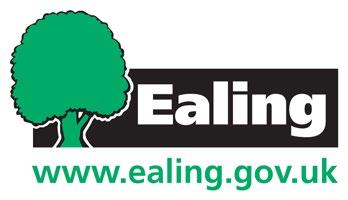
“It’s vital to ensure that everyone who is subject to enforcement action is treated fairly. We welcome the establishment of the Enforcement Conduct Board to deliver independent regulatory oversight of the enforcement sector which will help drive up standards across the sector and beyond.”

Andrew Pester - Chief Executive, British Parking Association
“The coming year presents significant challenges for local authorities as they seek to collect debt effectively, whilst providing meaningful support to those in financial difficulty. The IRRV hope that in its first year, the ECB will continue to develop its inclusive approach with key stakeholders so that shared knowledge and expertise will give rise to optimal solutions.”
Gary Watson IRRV (Hons)Chief Executive, Institute of Revenues, Rating & Valuation
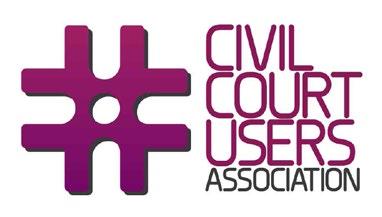
“We’d like the ECB to work with the enforcement profession and the debt advice sector to collectively evolve our enforcement system so that it continues to protect the vulnerable and allows for effective enforcement. The ECB can help ensure the enforcement profession’s quality standards are appropriate, transparent, consistent and better understood across the debt advice sector.”

Alan J Smith - Chair, High Court Enforcement Officers Association
“The CCUA is extremely excited by the launch of the ECB. Greater transparency and oversight of enforcement will benefit all those who are involved with or touched by it. We look forward to the Board quickly establishing itself and hopefully expanding its role in due course, creating greater confidence and thereby possibly allowing for increased involvement of the private sector within enforcement.”
Robert
Thompson - Chairman, Civil Court Users Association
“I would welcome strengthening fairness for those who are indebted, enforcement agents, companies and instructing parties. Bringing clarity and consistency to existing legislation and to promote openness, transparency, and communication across all stakeholders. And providing a vulnerability framework to support the identification of people who are most in need and who need additional support.”

Karl SmithHead of Becontree Collection Service, London Borough of Barking & Dagenham
“I had the pleasure of meeting with Catherine Brown back in the summer. Catherine had just appointed some excellent board members and was exploring options for funding which I am pleased to see that has now been agreed. It was great to hear Catherine clearly outline the aims, objectives and future direction for the ECB. I had the opportunity to share some of my thoughts on how Southwark as a Local Authority could do more with greater access to and improved data to ensure the quality of referrals for enforcement. We have made good progress in recent years in identifying customers where enforcement would not be appropriate but feel with enhanced customer data sets, we could do much more and therefore only refer debts for enforcement where the data is telling us that it is the most appropriate action to take.”
Norman Lockie - Head of Income Operations,
Southwark Council
12 ENFORCEMENT NEWS • Winter 2022 • CIVEA Civil Enforcement Association
We asked some key stakeholders about their expectations for the Enforcement Conduct Board. Their answers show widespread support for industry oversight, but a clear need for collaboration to meet the challenges facing central and local government.








13 CIVEA Civil Enforcement Association • Winter 2022 • ENFORCEMENT NEWS Ethical & Efficient Enough Said t: 01792 645544 e: enquiries@ajenforce.co.uk w: www.ajenforce.co.uk TRACE SERVICES – UP TO DATE DEBTOR CONTACT DATA AT THE CLICK OF A BUTTON DATA SERVICES; • Fully automated process with no minimum batch size • Low cost service, tracing debtors with no forwarding address • Prompt turnaround on trace results (within 24 hours) Tel: 01772 842092 Email: info@destin.co.uk www.destin.co.uk Data Services Ad Nov 22.qxp_Layout 1 08/11/2022 21:59 Page 1 Want to appear in our magazine? We are looking for contributors for Enforcement News. If you are interested in writing an article, either as a one-off or a regular piece, please contact us at: enfnews@wsacommunications.co.uk or call 01908 371177 . The quarterly magazine from CIVEA, the Civil Enforcement Association SPRING 2021 COVID-19 and the Breathing Space regulations COVID-19 Support Plan We enter a new era for enforcement, writes Carole Kenney • Reflection & Collection: Russell Hamblin-Boone introduces the 2022 CIVEA conference The quarterly magazine from CIVEA, the Civil Enforcement Association SPRING 2022 The quarterly magazine from CIVEA, the Civil Enforcement Association Parking the government’s cash cow?









IRRV Conference and Exhibitions Spring Conference & Exhibition 2023 The Queens Hotel, Leeds, 16 & 17 May Annual Conference, Awards & Exhibition 2023 Telford International Centre, Telford, 4 to 6 October Stands and sponsorships are selling fast, have you booked yet? Further details can be found at: https://irrv.net/homenew/page.php?wid=39 Download our 2023 media pack at: https://irrv.net/mediapack Contact: Vicki Chastney Email: vicki.chastney@irrv.org.uk Tel: 0207 691 8979
In August 2022, Excel Civil Enforcement was delighted to be recognised with the Ministry of Defence Employer Recognition Scheme (ERS) Silver Award, after holding the Bronze Award since 2020.


On 22nd September 2022, three of the Excel team, all ex-Armed Forces personnel, went to the awards ceremony at the National Museum in Cardiff, Wales, to collect the award.
22 Welsh organisations were presented with the prestigious ERS Silver Award for 2022. The award is made to employers who have actively demonstrated their support for the Armed Forces community through implementing practical policies in the workplace.
These employers actively ensure that their workforce is aware of the positive policies towards Defence people issues for
reservists,
Excel Director, Mike Garland (Royal Corps of Signals) commented: “Excel has, for many years, recognised the benefits of employing veterans and reservists who not only bring essential skills but a sense of duty and loyalty which those of us who have served can really appreciate. We are delighted and extremely proud to have been recognised by the Silver Award and will build on this as we aim for Gold.”
“At Excel, we have a long history of recruiting former serving members of the armed forces and they make up around 20% of our front-line staff. We are also the only enforcement agency which is a preferred training provider to the MoD’s Career Transitional Partnership (CTP).“
Excel presented with Defence ERS Silver Award 15 CIVEA Civil Enforcement Association • Winter 2022 • ENFORCEMENT NEWS Award-winningnationwide enforcementforlocalauthorities Fast,fairandeffectiveenforcement: Counciltax,businessrates,arrestwarrants,parkingandtrafficmanagement HighCourtenforcementfortherecoveryofmoneyjudgmentsandproperty/land 100%employedandfullyqualifiedenforcementagents Forthebestoutcomes,getintouchtoday. Contacttheexpertson 03303639988 www.excelenforcement.co.uk
veterans, Cadet Force adult volunteers, spouses and partners of those serving in the Armed Forces.
Visit: newlynplc.co.uk/new-business-enquiry









Email: lappleby@newlynplc.co.uk (North) sbyrne@newlynplc.co.uk (South)

16 ENFORCEMENT NEWS • Winter 2022 • CIVEA Civil Enforcement Association
best
• Accountable • Human • Innovative • Integrity • Passion • People WWW.BRISTOWSUTOR.CO.UK LEADING THE WAY PROMOTING FINANCIAL EDUCATION TO ADDRESS PROBLEM DEBT FUNDING FINANCIAL CAPABILITY TRAINING TO SUPPORT THE COMMUNITIES WE WORK IN WORKING IN PARTNERSHIP TO DRIVE CHANGE IN THE ENFORCEMENT INDUSTRY
To be the
at what we do today and in the future for our staff, clients and the community.
Kent Police recently reached out to CIVEA to enlist its help in increasing awareness amongst Enforcement Agents (EA’s) of Modern Slavery and Human Trafficking (MSHT). Many people are unaware that slavery exists in the UK. EA’s are more likely than most to encounter evidence of MSHT because of the number and variety of premises they visit and their statutory rights of entry, hence the desire of the police to enlist our help. In a recent case, the EA reported their suspicions to the police regarding what they had witnessed during a visit, and this lead to successful prosecutions.




The government estimates there are around 10,000 victims of MSHT in the UK, but MSHT experts put the figure closer to 130,000. British citizens born in the UK comprise the largest group (34%) of victims. Most of these are children or vulnerable adults. The remainder are trafficked into the UK from countries such as China, Vietnam, Nigeria, Romania and Albania.
On arrival, they are forced to work in a wide variety of unskilled ‘occupations’ including agricultural labour, domestic servitude, nail bars, hand car washes, prostitution, organised begging, shoplifting and as drug mules.
Many people find it difficult to understand how it’s possible to prevent slaves from escaping. What stops them from simply running away and seeking help from the authorities?
Victims are invariably uneducated with little or no knowledge of the UK. They don’t speak English. They are brought in illegally and have no documentation or ID. Their captors tell them that if they go to the authorities they will be arrested as illegal immigrants and police will beat or rape them. They will serve a long term of imprisonment before being deported. In some cases, the captors know the names and addresses of the victim’s family in their country of origin and threaten to kill the family if the victim isn’t compliant.
Sometimes victims are simply kidnapped off the street before being brought to the UK. In other cases, the captors pose as a legitimate employment agency and advertise on social media that they are looking for people to take up well-paid jobs in the UK. Those who respond are initially treated OK, until they arrive in the UK. They are then told that they owe the ‘employment agency’ £20K because this is how much it cost to get them into this country and find them a ‘job’. As the victim has no concept of UK prices this can seem plausible. They are told their ‘job’ pays £30 a week. They will be allowed to keep £10 and the other £20 will go towards paying off the £20K debt – which of course will never be paid off because other expenses will be invented. This type of victim often doesn’t realise they are the victim of a crime and blame their predicament on their own ignorance. Some victims pay people smugglers to bring them into the UK and they are then sold as slaves.
In October I attended an MSHT conference in Kent supported by Kent Police. I realise that I have probably seen evidence of MSHT on a number of occasions whilst working as an EA, but without realising it because it was before I had been trained and I didn’t know what to look for. What to look for and how to report suspicions is too large an issue to be covered in a short article and proper training is needed. The public sector increasingly expects EA’s acting for them to have received training in MSHT and the police are increasingly willing to assist with this. Whyte & Co provides training for all its EA’s and I would urge all enforcement agencies to do likewise.
Broadbent Director of Operations, Whyte & Co
Slavery and Human Trafficking (MSHT)
Modern
“We are so pleased with the revenue generated from a batch of cases that was due to be written off, we also wish to thank you for the sensitivity shown to the customers achieving these collections with zero complaints received” Royal Borough of Kensington & Chelsea Get your free no obligation Income Projection Report today contact: Karl Smith Email: karl@whyte.co.uk Direct Line: 01322 661747 Mobile: 07973 113649 Are those non-performing liability orders going to be written off - £££’s lost down the drain? How to increase revenue for vital services without complaint in 4 simple steps: These 4 simple steps Guarantee you will collect – with zero complaints 1 Confidential Consultancy Send them securely to Whyte & Co 2 Evaluation and Planning We will cleanse and score them, placing them in a bespoke process flow and provide you with a Free Income Projection Report detailing what income you can expect from your portfolio 3 Service Level Agreement Simple SLA drawn up to proceed with recovering your revenue 4 Recovered Revenue Creating a predictable revenue stream Have you got aged liability orders awaiting write off? Collection and Increased Revenue is in your hands Proven award-winning system to collect aged non-performing debt…. £ WINNER 2020 Global 100
Trevor
Do you prefer documentaries or reading a book?
Nowadays, most people prefer to sit down and watch a documentary rather than read a book with pictures, when having a something explained to them. Often, if that person is of a certain age, then they generally respond more to something they can watch on their phone, rather than read.
Travelling on the underground, buses and trains for the last 30’ish years, I have observed the decline in people reading books and the growth of people watching videos and films on mobile devices.
I’m not taking anything away from the pleasure of a book to bury yourself in, but it’s just more common to see people use the audio-visual medium rather than a paper format for information.


The point I want to make is whether an audio-visual medium can have a greater role in the enforcement process to help advise customers as to what can, or will happen, should they not act or engage with the sender.
Just thinking for a moment about how some customers react when opening the notice of an enforcement letter. Would a video be a better medium to get the message across, rather than a sheet of paper with words which may be unfamiliar to the reader?

Whilst the use of informational videos is not exactly new, the cost of the creative production means the risk of getting it wrong, outweighing any potential gain. Video contact has been used in enforcement before but is quite general, and due to the cost of production, not produced for a range of recovery stages.
In the last few years, we have seen the advancement in synthetic voice and avatar video quality. You may have seen or read stories of deep fakes and AI (or artificial intelligence) representing real people for negative purposes. ‘The Capture’ was a recent BBC drama, looking at the sinister side of the future on this topic.
However, this technology and quality of it to create and use avatars to explain something for a positive outcome, is now more available and affordable, and could or should be used by companies and organisations to convey or explain messages, including enforcement.
Using visuals and audio can create sentiment, empathy, and a sense of urgency in a way that a sheet of paper can never hope to equal.
When you combine a video opportunity with proactive digital engagement, as shown here, where a video is inserted into the SMS text message, the immediate reaction to many that open the message is to watch the video.
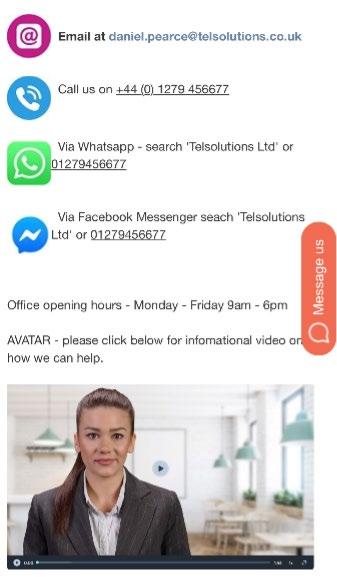
Will it work? Think of your behaviour and the behaviour of all generations, not just the millennial Tik Tok generation. Watching someone explain something is easier than reading something for many.
If you can claim to have not watched a video on YouTube, Facebook or Tik Tok recently, then you must have lost your phone…
As a business supplier, I have been asked many times on whether we could provide the capability to insert videos into messages. The answer has always been yes, but we cannot make them. The last time I tried to make a set of business films, my boss was left laughing and crying at the cost and comedy quality. Thankfully I kept my job, and they became a hit, but never again.
Using avatars to represent a person and explain a subject matter has become affordable and will enable firms and organisations to produce excellent and professional quality short films that can be hosted on websites, within emails, SMS text messages, and even accessed via QR codes printed on letters.
Avatars and AI are not the silver bullet to solving every customer’s situation and engagement but are another very useful tool that will appeal to some and not to others.
There are always early adopters willing to give something a go first, and whilst the results data builds with this new channel to get customers engaged, there is no doubt that customers are watching them in healthy numbers. Both Whyte & Co and One Source Enforcement are currently exploring the use of AI avatars with success.

ENFORCEMENT NEWS • Winter 2022 • CIVEA Civil Enforcement Association 18
For less than the scrap value of the Fiat Panda with 20 parking tickets that your vehicle recovery team dragged off the streets last week, anyone can have a professional quality tool to explain visually, what happens next during the compliance stage and create an engagement for customers that respond more to this medium than letters. This could really help with customers that are vulnerable or have accessibility needs.
You can of course, create videos in-house, but that could expose staff playing the parts to possible recriminations, and the quality of production being ridiculed as I have experienced. Can your IT team make these for you? IT are always busy, being busy and thinking about projects to keep them busy, looking at how to stop ideas they did not invent. Harsh but true. They can, but so can anyone now with this technology.
With a greater emphasis from local authorities to show how enforcement teams are helping and understanding customers, any tool that increases or simplifies engagement is worth a try.
Innovation through collaboration.
Chatbots, Voicebots
Driving the conversations in enforcement
Immersive customer technology & services for process automation that includes Chatbots and now Voicebots.

Listening, learning to understand and work with customer for better outcomes and case resolution.
From the leader in debt and enforcement customer engagement services Telsolutions.

Using intuitive customer communications to enhance income and recoveries.

Adopting behaviour automation to create efficiencies & positive outcomes.
Telsolutions – Alwaysgoalittlefurther www.telsolutions.co.uk

For more information on our services, please contact: Alyn Lewis – Client Development Director al@jacobsenforcement.com 0151 650 4979 www.jacobsenforcement.com
Jacobs lead the profession in providing seamless Enforcement and Debt Collection services by working in partnership with our Local Authority, Commercial clients and Her Majesty’s Courts and Tribunals Service.
19 CIVEA Civil Enforcement Association • Winter 2022 • ENFORCEMENT NEWS
Daniel Pearce Director of Business Development, Telsolutions Ltd

Are enforcement companies doing enough to help customers with the cost of living crisis?
A recent ONS survey into the impact of increased cost of living found that almost half of all adults are finding it difficult to afford their energy bills (up from 40% in Spring), and 30% are struggling with their rent or mortgage payments. This is bound to have a significant impact on the enforcement sector as people prioritise keeping the heating on and food on the table, over paying their debts, but how can the industry help support people through this crisis period?
Improvements have been made across the sector with welfare teams and specially trained vulnerability champions changing the way companies handle vulnerable customers, but engagement is the key. Experience tells us that when faced with mounting debts, customers tend not to answer calls or respond to letters and texts, and a different approach is therefore needed to persuade them to get in touch.
One initiative being pursued by the enforcement sector is debtor surgeries; aimed at reaching out to the growing number of debtors ignoring traditional engagement methods. Working in tandem with councils, companies are holding local events to try to bring in struggling debtors in order to offer support and guidance with their council debts. These surgeries are useful to obtain income and expenditure details, set up payment arrangements and signpost people to support organisations.

JTR Collections have taken the ‘debtor surgery’ concept one step further by including debt advice experts and local authority ‘early engagement’ specialists on the panel. At a recent ‘Cost of Living Roadshow’, representatives from Christians Against Poverty were invited along and assisted with a variety of ‘non-council’ debt issues.
The event was held at a local community centre which provided free hot meals for those who needed it most. They were able to inform customers about additional help available on their doorstep including the local foodbank who attended the same centre every week. At the Roadshow, online benefits calculators were utilised to highlight additional financial support which may be available, and practical advice was given to assist customers with budgeting. Emergency fuel vouchers were supplied, and the council’s household support fund was utilised. Where more complex situations were highlighted, Christians in Poverty set up follow-up appointments.
The Roadshow attracted a cross section of customers who may not have wanted to attend a council/enforcement specific ‘debtor’ event. JTR intends to extend future events into the evening to make it easier for working people to attend.
In order to best serve their customers during the current cost of living crisis there is clearly a place for similar joint working events, and Councils should review what assistance their enforcement provider can offer.
 Bates Senior Business Consultant, JTR Collections Ltd
Bates Senior Business Consultant, JTR Collections Ltd
21 CIVEA Civil Enforcement Association • Winter 2022 • ENFORCEMENT NEWS
Adrian

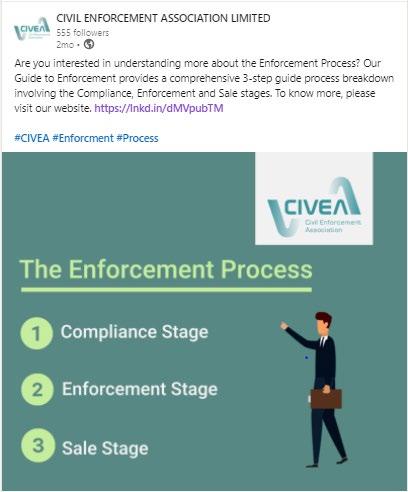
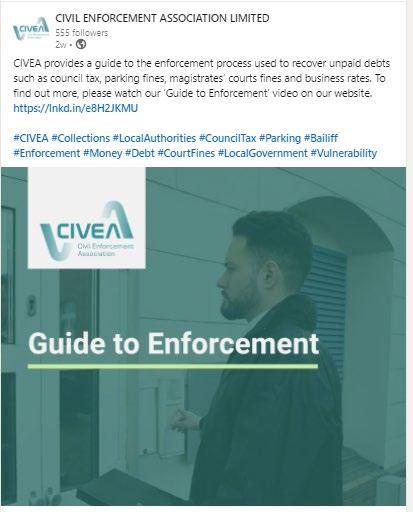
DO YOU FOLLOW OUR CIVEA LinkedIn PROFILE? Follow us to see our latest official: • press releases • government news updates • website blogs ...where we discuss industry topics and updates from the enforcement industry. Our regularly released blogs focus on key topics being discussed in the enforcement industry from updates from the Ministry of Justice to Government enforcement updates and regulations. LinkedIn: https://www.linkedin.com/company/civil-enforcement-association-limited Website: https://www.civea.co.uk/ CIVEA PO Box 745 WAKEFIELD WF1 9RJ Email: admin@civea.co.uk Telephone: 0844 893 3922


































































 Bates Senior Business Consultant, JTR Collections Ltd
Bates Senior Business Consultant, JTR Collections Ltd


